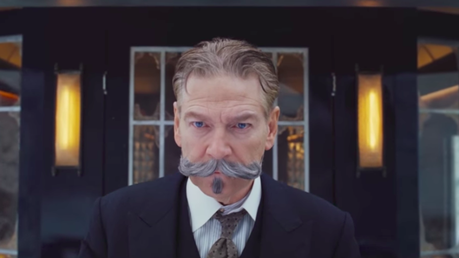A single-location murder mystery crowded with intense psychological portraits, shifting loyalties, pleasantly nasty surprises, a gallery of stars, panoramic vistas and keyhole surgery into the darkest corners of the human heart? Who wouldn't take such a trip?
When you put it that way, as Total Film Magazine did in its recent 4-page spread, Kenneth Branagh's Murder on the Orient Express sounds like a slam dunk. That's what makes its failure so disappointing. This should have worked. Put a bunch of stars and respected English actors on a train, have them act out Agatha Christie's infamous murder-on-a-train-and-everyone's-a-suspect story, entrust direction and lead performance to Branagh, throw a decent chunk of change ($55m) at it to make sure it looks good and the end result should be an engrossing mystery movie, the likes of which we rarely see anymore. Instead, what we get is a surprisingly inert narrative, an ample amount of style, and precious little substance. Other than Branagh's already-classic mustache, there's nothing here you won't forget about in a week.

It starts off so promising, though. Cinematographer Haris Zambarloukos treats us to a sumptuous version of 1934 Istanbul, his 65MM camera swooping in and out of the city to track the movements of a small servant child sent to the market to retrieve eggs for a particularly persnickety and obviously rather important guest. This guest, of course, turns out to be Hercule Poirot (Branagh, buried somewhere under that mustache), the world's most famous detective, and he's in town to solve a crime that has the city's Jews, Christians and Muslims on the verge of war.
When he attends to the crime scene and lines up the three suspects along the Wailing Wall, he commands the crowd with astonishing ease, disarming them with his humor but capturing their attention with the authority and confidence in his voice and demeanor. It's a genuine joy to watch a master at work, and the hilarious way he both solves the crime and anticipates the criminal's attempted escape route serves as a perfect introduction to the character.
If only the rest of the film matched that joy. By the time Murder on the Orient Express gets to its second and final "I have solved the crime" sequence, all narrative momentum has been squandered. You initially greet the sight of Poirot at work with great anticipation. By the end, you're happy to see him solve the crime on the train simply because him doing so will finally mean the end of this interminable movie. Moreover, by that point Zambarloukos' once welcomed camera has become a genuine problem, staging lengthy oners for no narrative reason, veering down on crucial conversations from above in confusion fashion, peeking through glass windows to blurry the image, etc.
Which is such a shame because when you have established talents like Dench and Jakobi as well as, Johnny Depp, Josh Gad, Willem Defoe, Olivia Colman, Michelle Pfeiffer, and Penelope Cruz paired with next big things like Daisy Ridley, Lamar Odom, Jr., Lucy Boynton, Manuel Garcia Rulfo, and Marwan Kenzari you don't need to reinvent the wheel. Instead, stand back and let them play. Far too often, Orient Express simply gets in their way. Heck, it loses track of Boynton's character entirely, to the point when Poirot finally interviews her about the murder you might ask, "Wait, who's this now? Has she been on the train this entire time?"
Branagh and screenwriter Michael Green clearly made a conscious choice to focus less on the whodunit and more on the whydunit. We are thus meant to care less about the identity of the killer and more about the tragic backstory which all of the suspects seem to share and how exactly that could lead them to murder. Poirot even quotes Shakespeare (because it's Branagh) at one point to get at the evil lurking in the hearts of men and women. That could, in theory, give the actors more material to work with, and at times they make an enjoyable meal out of it. Ridley, in particular, is every bit as captivating playing a strong-willed woman unphased by Poirot's power and genius as she was playing Rey opposite cinematic icons like Han Solo and Leia in Force Awakens.
However, Murder is ultimately stuck serving two masters. It wants to be a murder mystery experimenting with 65MM panoramas to find new ways to photograph crime scenes, evidence gathering, and interrogations. It also wants to be a deceptively deep exploration into the psychological aftermath of tragedy and what Poirot's exposure to such sadness does to his moral code and steadfast belief in justice. In the end, it doesn't properly service either side of the story, leaving us with a film filled with lots of great parts (Branagh and Ridley's performances being clear highlights) that don't quite come together or add up to much.
THE BOTTOM LINEThe art departments killed themselves to make everything look gorgeous. The production team thought up ingenious ways to recreate the real Orient Express atop a mile and a half of train track laid down at Longcross Studios in Surrey, England. And the makeup and hair department deserves an Oscar for Branagh's mustache alone.
A shame, then, it was all in service to such a forgettable movie.
ROTTENTOMATOES CONSENSUS
Now it's your turn. Let me know how wrong or right I am in the comments below.

